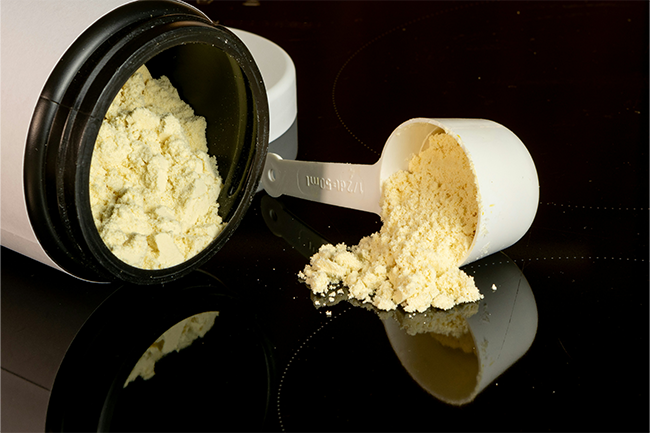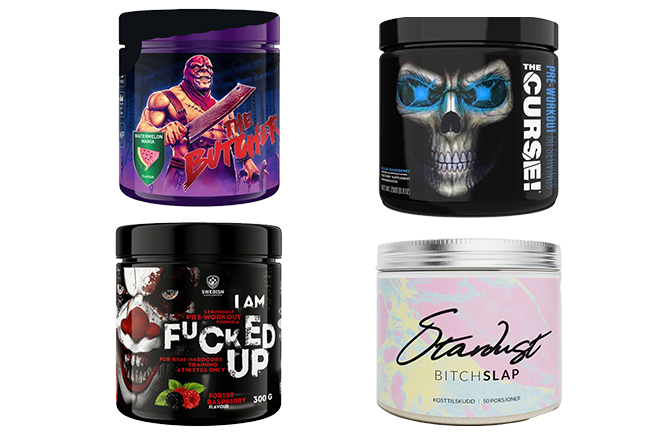One in two young people use muscle-building dietary supplements
31. oktober, 2024
A new survey shows that 50 per cent of young people between the ages of 13 and 24 use muscle-building dietary supplements, such as protein powder and so-called ‘pre-workout’ products. ‘Completely unnecessary if we have a normal, healthy diet,’ says the Norwegian Consumer Council, who want mandatory labelling of content advertising for dietary supplements.

The market for dietary supplements is growing, and the marketing of these products is often aimed at young people. The Norwegian Consumer Council has examined the use of dietary supplements and body-image pressure in children and young people aged 13 to 24 years.
Half of the respondents report using muscle-building dietary supplements or products that can help their muscles to perform better during training (see list of products in the fact box).
According to the survey, building muscle, and building muscle fast, is especially important for boys and is a significant cause for the use of muscle-building dietary supplements.
A waste of money
— Having a a normal, varied diet will plenish our protein needs. Appropriate sources of protein are eggs, milk, beans, lentils, fish, meat, nuts and seeds. Unless you are a body builder, protein supplements are quite unnecessary in the vast majority of cases, says Inger Lise Blyverket, director general of the Norwegian Consumer Council.
The survey shows that some respondents also replace entire meals with protein supplements. Supplements like these must not be consumed at the expense of normal food, Blyverket emphasises.
— Children and young people should not be spending their money on something that is unlikely to have an effect, and in the worst case can cause serious health problems, such as anxiety, restlessness and dizziness. Eating normal, healthy food will ensure a good, balanced diet.
A health paradox
The survey shows that half of those in the age group 13 to 24 years use muscle-building dietary supplements, among which are protein powder and so-called ‘pre-workout’ products. Blyverket is particularly concerned about the latter.

— Apart from the name and the design, which clearly appeal to the younger generation, these blended products contain a lot of caffeine. If you buy pre-workout products from online retailers abroad, they may contain undeclared ingredients or even doping agents. In pursuit of a healthier body, you may end up with the opposite by consuming substances that put your health at risk, she states.
Mandatory labelling of advertisements
Blyverket is calling for measures to be implemented against the marketing of dietary supplements, for example through mandatory labelling of content advertising such as the Norwegian Consumer Council’s ‘retouched person’ label. This type of labelling should be applied to all content marketing, including products that are not dietary supplements.

— It is often difficult to judge whether or not something is an advertisement. Producers of dietary supplements also market their products via so-called ambassadors rather than traditional influencers, and we believe that this plays a role in blurring the line between paid content and genuine opinions, says Blyverket.

The Norwegian government is now working on a white paper on the digital upbringing of children and young people. This represents a golden opportunity to eradicate the massive marketing pressure exerted on children and young people, according to Blyverket.
— We expect that politicians will view mandatory labelling of content marketing as one of several measures to safeguard children and young people in their daily use of digital technology. This will make it easier for all parties – both for advertisers, who will have transparent and explicit rules to follow, and for consumers, who will almost immediately be able to distinguish between advertising and ‘genuine’ content, Blyverket states.

Andreas Framnes
Kommunikasjonsrådgiver – mat og helse, digital
What products have we looked at?
The Norwegian Consumer Council has looked as several product groups, some of which have been combined as they are all either marketed as muscle-building or intended to help muscles to perform during training.
Read the survey here.
By muscle-building dietary supplements we mean:
Energy drinks with BCAA
Protein powder
Protein supplements (e.g. protein shakes, protein pudding and protein pancakes)
Weight gainers
BCAA or EAA
Beta-alanine + nitrate
Creatine
Pre-workout products
Professional Committee for Influencer Marketing (FIM)
FIM’s role is to ensure that influencers adhere to the rules on unattainable appearance standards. The committee’s activity is largely based on complaints received from consumers.
However, the Norwegian Consumer Council’s survey shows that only four per cent of young people in the age group 13 to 24 years have heard of FIM. Of those that have heard of the committee, only a little over half know what purpose FIM has.
For FIM to achieve its objectives, public awareness of the mechanism is needed. The Norwegian Consumer Council considers that a thorough evaluation of the FIM mechanism is needed to protect children and young people from harmful marketing of dietary supplements.


